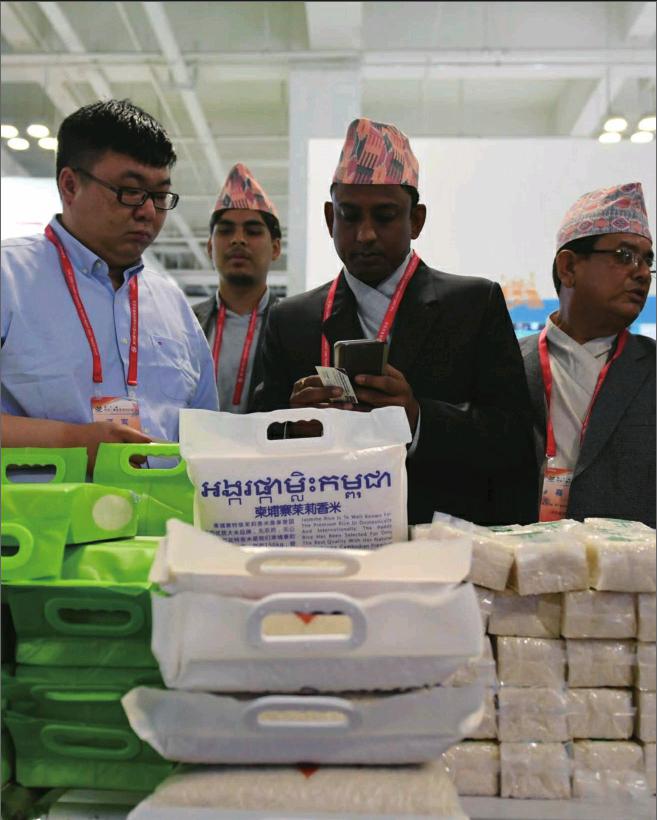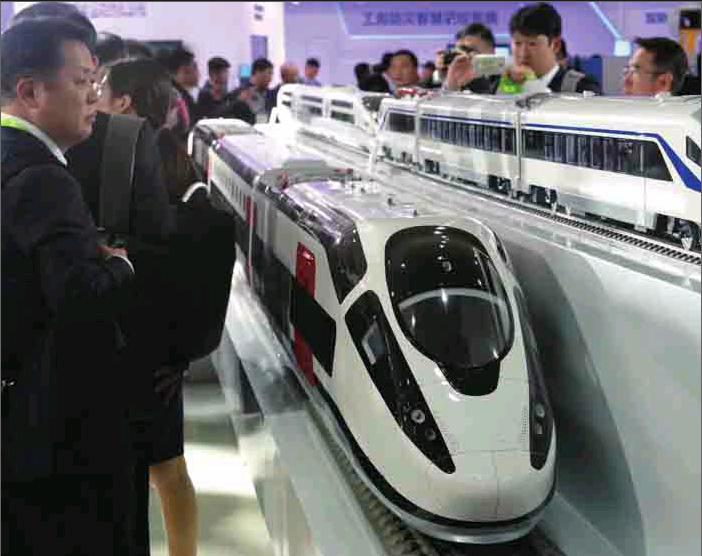TRUMPETING A NEW ERA
2017-11-27ByMeiXinyu
By+Mei+Xinyu



A Reuters report on October 17 de- scribed the concerns of a young Chinese woman working in the United States that she might miss out on the new development opportunities in China and her change of mind about whether or not to return to China. “This time back in China the feeling that I have is one of worry that it would be very easy to be left behind if I return to the U.S.,” Zuo Aining, a tax consultant in Washington, D.C., told Reuters.
“My life is going as I planned five years ago,” she said. But, “if there is a better platform and opportunity for me to do what I want to do, I will come back without any hesitation.”
This well illustrates the conclusion in the report delivered by General Secretary of the Communist Party of China (CPC) Central Committee Xi Jinping to the 19th CPC National Congress that socialism with Chinese characteristics has entered a new era.
Based on the changes of Chinas status in the world economic system, Chinas leadership has put forward this conclusion, and those who have cross-cultural experience will be most aware of such changes.
As a developing economy, China has become the worlds largest manufacturer, the largest exporter, a major source for global economic growth and a stabilizer of the world economy, providing an example of success for other countries. This has enabled Chinas leadership to announce the new era for socialism with Chinese characteristics and made both Chinese people and the external world fully accept such a conclusion and discuss what opportunities this new era will bring to themselves and the world.
As stated in Xis report, “development is the underpinning and the key for solving all our countrys problems,” “we must continue to pursue development as the Partys top priority in governance,” and “unlocking and developing the productive forces is a fundamental task of socialism.” The report also vowed to “actively participate in and promote economic globalization, develop an open economy of higher standards, and continue to increase Chinas economic power and composite strength,” indicating that socialism with Chinese characteristics for a new era will provide more opportunities to the world for joint development and set up a better model of success through hard work.
Laying the foundation
Chinas status in the world economic system is based on the progress of industrialization. After World War II, almost all the emerging countries freed from colonial and semi-colonial status set the goal of industrialization, but only few of them succeeded, while China is among the most successful.endprint
Nearly a decade ago, China had become the worlds largest manufacturer, with remarkable advantages in traditional laborintensive manufacturing industries; in 2013, its output of equipment manufacturing accounted for one third of the worlds total; in 2009, the country had established 39 industrial sectors, being the only one in the world possessing all the industrial categories listed by the United Nations, making itself the “workshop of the world.”
With its progress in industrialization, China has been providing finished products to people around the world and “madein-China” covers markets worldwide, remarkably improving the wellbeing of the world. “Made-in-China” has played an even more significant role in improving peoples livelihoods in developing countries.
In the tide of mobile telecom development, people across almost the entire African continent rely on Chinese-made telecom equipment and affordable cellphones to enter the era of mobile payment, despite a lack of access to fixed phones and poor bank facilities. Similarly, a great leap forward to mobile payment also occurred in India and some other countries. Besides, relying on cheap Chinese-made goods, wholesale and logistics businesses have also prospered in Africa and Latin America.
From a broader perspective, it was the establishment of a uniform and stable order in the Peoples Republic of China since its founding in 1949 that enabled East Asia to start all-round industrialization and economic takeoff after World War II and become the most energetic region in the developing world, with several economies ranking among the leading and high-income economies of the world.
Stabilizer of the world economy
Sustainable and continuous economic growth in China makes the country play an increasingly important role as a stabilizer of the world economy. Since the 1980s, China has been serving as a stabilizer in the regional economy of East Asia, and after the Asian financial crisis in 1997, its role of stabilizer in the East Asian economy became increasingly prominent. Entering the 21st century, China has upgraded from East Asian economic stabilizer to world economic stabilizer and engine. Statistics show that in the first decade of the new century, the average annual contribution of Chinese economic growth to world economic growth reached 14.2 percent; during the 2011-15 period, Chinas annual contribution to world growth in terms of U.S. dollar prices in 2010 reached 30.5 percent, ranking first in the world, while in the same period, the contributions of the United States and the euro zone were 17.8 percent and 4.4 percent respectively. In 2016, China still contributed the most to world economic growth: 33.2 percent in terms of U.S. dollar prices in 2010. Calculated with 2015 prices, Chinas contributions reached 41.3 percent, while those of the United States and Japan were 16.3 percent and 1.4 percent, respectively.endprint

Chinas growth is decisive for the fundamental changes in the contributions to world economic growth by different countries. According to the World Economic Outlook issued by the International Monetary Fund in April, from 1976 to 1979, developed economies contributed more than 80 percent to world economic growth, and the figure declined to 70 percent in the 1980s, 60 percent in the 1990s and 45 percent in 2000s. From 2010 to 2015, developed economies only contributed 30 percent to world economic growth, while the contributions of emerging and developing economies reached 70 percent, reversing the structure in the 1980s. Such changes would never have taken place without the economic growth in China.
Sharing success
To Chinas trading partners and the world economy, it is praiseworthy that Chinas economic growth and imports growth boost each other as the countrys markets become increasingly open to the outside world. Since the outset of this century, the growth rate of Chinese imports has almost doubled the average rate in the world, providing good opportunities to Chinas trading partners.
China replaced Japan and became the worlds third largest importer in 2004, only after the United States and the EU, and later surpassed the EU to become the number two importer in the world. In the first three quarters this year, Chinas imports grew by 22.3 percent year on year, almost double the growth rate of its exports in the same period.
In the international economic system, one of the most important roles China plays is providing an example of realizing prosperity through hard work. Chinas experience is now yielding positive results in some countries: Mulatu Teshome, a graduate of Peking University, is leading Ethiopia to become a successful example of economic development in Africa. China, which has announced it is entering a new era of socialism with Chinese characteristics, is willing to share its development experience with more partners.
In the report delivered to the 19th CPC National Congress, Xi proposed the goal of significantly furthering opening up and adopting policies to promote high-standard liberalization and facilitation of trade and investment. To Chinas trading partners, this indicates that China will create more trade opportunities for mutual benefit. endprint
endprint
